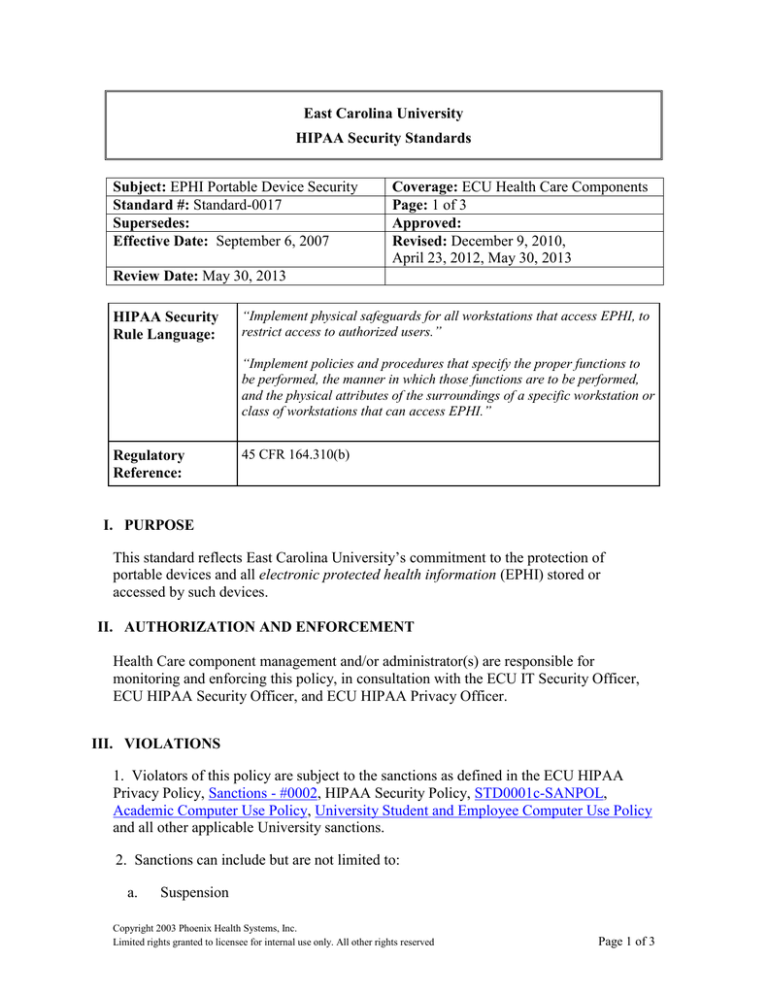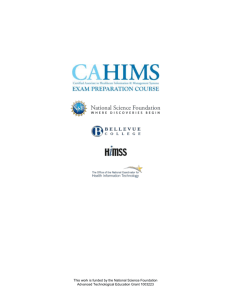
East Carolina University
HIPAA Security Standards
Subject: EPHI Portable Device Security
Standard #: Standard-0017
Supersedes:
Effective Date: September 6, 2007
Coverage: ECU Health Care Components
Page: 1 of 3
Approved:
Revised: December 9, 2010,
April 23, 2012, May 30, 2013
Review Date: May 30, 2013
HIPAA Security
Rule Language:
“Implement physical safeguards for all workstations that access EPHI, to
restrict access to authorized users.”
“Implement policies and procedures that specify the proper functions to
be performed, the manner in which those functions are to be performed,
and the physical attributes of the surroundings of a specific workstation or
class of workstations that can access EPHI.”
Regulatory
Reference:
45 CFR 164.310(b)
I. PURPOSE
This standard reflects East Carolina University’s commitment to the protection of
portable devices and all electronic protected health information (EPHI) stored or
accessed by such devices.
II. AUTHORIZATION AND ENFORCEMENT
Health Care component management and/or administrator(s) are responsible for
monitoring and enforcing this policy, in consultation with the ECU IT Security Officer,
ECU HIPAA Security Officer, and ECU HIPAA Privacy Officer.
III. VIOLATIONS
1. Violators of this policy are subject to the sanctions as defined in the ECU HIPAA
Privacy Policy, Sanctions - #0002, HIPAA Security Policy, STD0001c-SANPOL,
Academic Computer Use Policy, University Student and Employee Computer Use Policy
and all other applicable University sanctions.
2. Sanctions can include but are not limited to:
a.
Suspension
Copyright 2003 Phoenix Health Systems, Inc.
Limited rights granted to licensee for internal use only. All other rights reserved
Page 1 of 3
HIPAA Security Standard # 0017: EPHI Portable Device Security
b.
c.
d.
Required retraining
Letter of reprimand
Termination
IV. STANDARD
ECU Health Care Components must implement appropriate controls to ensure the
protection of portable devices that store or access EPHI.
V. APPLICABILITY
This Standard is applicable to all workforce members within any ECU Health Care
Component who use or disclose EPHI for any purpose. This Standard’s scope includes
all protected health information in electronic form. The safeguards in this Standard apply
to all handheld devices whether University-owned or individually-owned and that are
used to access, transmit or store EPHI which include but are not limited to: Digital
Organizers, Personal Digital Assistants (PDA), Smart Phones, Wireless E-mail Devices,
USB Drives Laptops, and any other portable device used to store or access EPHI.
VI. PROCEDURE
The following safeguards must be implemented to satisfy the requirements of this
standard:
1. ECU Health Care Components who cannot implement the safeguards
recommended in this Standard must provide other acceptable compensating
controls. All compensating controls must be reviewed and approved by the
HIPAA Privacy and Security Officers in advance of implementation.
2. All EPHI stored on handheld computing or portable storage devices must be
encrypted as required by ECU HIPAA Security Policy # Security-0016,
Healthcare Workforce Acceptable Use Policy.
3. EPHI shall remain on the device only as long as necessary.
4. Whenever possible, EPHI shall be discarded or transferred to a designated
secure storage area.
5. Whenever possible, any health information stored on handheld computing or
portable storage device shall be in a de-identified form. Information such as
names, date of birth, social security numbers, medical record numbers or other
individual identifiable information as outlined in the ECU HIPAA Privacy
policy, De-Identified Information, #0013.
Copyright 2003 Phoenix Health Systems, Inc.
Limited rights granted to licensee for internal use only. All other rights reserved
Page 2 of 3
HIPAA Security Standard # 0017: EPHI Portable Device Security
6. Software applications used to access EPHI which will be loaded onto any
portable device that houses, transmits, or accesses EPHI must be approved in
advance by the HIPAA Workgroup Committee.
7. Syncing of the device will be restricted to ECU desktops authorized and
configured to access EPHI on campus.
8. ECU Healthcare Components must implement appropriate physical security
safeguards to prevent the loss or theft of portable devices. Such safeguards
should include but are not limited to:
a. Activate locking software when device is unattended
b. Keep the device with you at all times when traveling
c. Keep the device in a locked location when not in use
9. Infrared and Bluetooth communication must be disabled while the device is
established in a network which allows access to EPHI.
10. At a minimum the following safeguards must be implemented when accessing
EPHI over a wireless network:
a. Wireless users must authenticate through the secure ECU Buccaneer
wireless network prior to accessing network resources.
b. Wireless communications must be encrypted when accessing EPHI. Two
possible encryption alternatives for on campus or remote connectivity
include the university’s Citrix system for access to Centricity EMR and
the university’s Virtual Private Network (VPN).
11. Any loss, theft or suspected unauthorized use of the device must be reported
immediately to the ITCS Help Desk and ECU Police.
VII. COORDINATING INSTRUCTIONS
1. All section policies, standards and procedures will be reviewed annually. Every
section policy, standard and procedure revision/replacement will be maintained for a
minimum of six years from the date of its creation or when it was last in effect,
whichever is later. Other East Carolina University, University of North Carolina
system, or state of North Carolina requirements may stipulate a longer retention
period.
Copyright 2003 Phoenix Health Systems, Inc.
Limited rights granted to licensee for internal use only. All other rights reserved
Page 3 of 3





